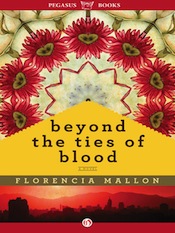New book combines love of fiction and history
As an undergraduate at Harvard University, Florencia Mallon wanted to write fiction. But fact came first.

Mallon
“For fiction, you really have to have a voice of your own,” Mallon says. “Back then, I wasn’t ready to express it.”
So she studied Latin American history, a subject she has written numerous books about and has taught at the University of Wisconsin–Madison since 1982. Born in Santiago, Chile, Mallon was named the Julieta Kirkwood Professor of History in 2006 and is currently chair of the History Department. She received her Ph.D. from Yale University.
Mallon has now used her years of research to write “Beyond the Ties of Blood,” her first novel, which was released in June to numerous positive reviews.
The book tells the story of Eugenia Aldunate and her life in the political aftermath of the 1973 Chilean coup. While in a torture camp, Eugenia discovers that she’s pregnant. She is eventually released into exile in Mexico and then moves to the United States where she becomes a journalist and professor. Nearly 20 years later, she’s called back to testify as a witness to the torture and violence she saw.
“It really was a different experience than writing a book about history,” Mallon says. “You tell stories in history like you do in fiction, but the material is already there.”
Mallon is a prize-winning historian and received the Bryce Wood Award for Best Book in Latin American Studies for “Peasant and Nation: The Making of Postcolonial Mexico and Peru” in 1995 and the Bolton-Johnson Prize for the Best Book in Latin American History for “Courage Tastes of Blood: The Mapuche Indigenous Community of Nicolás Ailío and the Chilean State, 1906-2000” in 2006. Mallon is the recipient of several national fellowships, including a John Simon Guggenheim Fellowship, an NEH Fellowship, and a Fulbright Faculty Research Abroad Fellowship. Mallon is one of the founding editors of Duke University Press’s Book Series on “Narrating Native Histories.”
While she still enjoys writing about history, there can be gaps, Mallon says. People may be reluctant to tell their entire story or have their name used. Or there is no longer anyone to talk about events from long ago. For her novel, Mallon had to imagine what her characters were going through.

“I feel strongly that the truth is more emotional and has an intuitive quality that goes beyond the facts,” Mallon says. “Some stories can’t be told through history.”
Having characters people found believable was essential.
“People are imperfect,” Mallon says. “If the character is too good, it won’t be interesting to the reader. If they’re too mean and don’t have some kind of redeeming quality, readers are not going to be interested either. All of my characters are heroic in some ways and flawed in other ways.”
Mallon already has ideas for other novels, which will continue to draw upon her expertise as a historian.
“All narrative writing is a process of discovery for the writer,” Mallon says. “It feels like there’s an element of coming full circle.”
As part of the Wisconsin Book Festival, Mallon will give a reading at 7:30 p.m. Wednesday, Nov. 7 in the Rotunda Studio of the Overture Center. To read excerpts from her novel, visit http://www.florenciamallon.net.
Tags: books, College of Letters & Science, history




